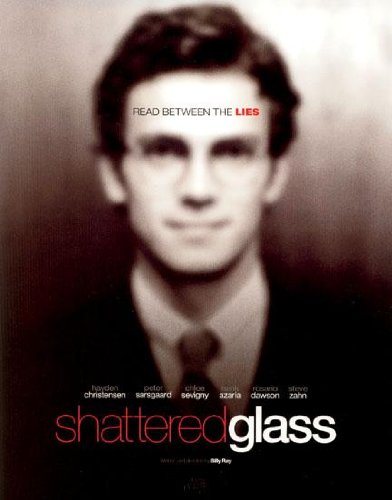All Nonfiction
- Bullying
- Books
- Academic
- Author Interviews
- Celebrity interviews
- College Articles
- College Essays
- Educator of the Year
- Heroes
- Interviews
- Memoir
- Personal Experience
- Sports
- Travel & Culture
All Opinions
- Bullying
- Current Events / Politics
- Discrimination
- Drugs / Alcohol / Smoking
- Entertainment / Celebrities
- Environment
- Love / Relationships
- Movies / Music / TV
- Pop Culture / Trends
- School / College
- Social Issues / Civics
- Spirituality / Religion
- Sports / Hobbies
All Hot Topics
- Bullying
- Community Service
- Environment
- Health
- Letters to the Editor
- Pride & Prejudice
- What Matters
- Back
Summer Guide
- Program Links
- Program Reviews
- Back
College Guide
- College Links
- College Reviews
- College Essays
- College Articles
- Back
Shattered Glass
Black words on a stark white page: “Hack Heaven,” the title of the story that sends Stephen Glass straight to hire hell. The movie Shattered Glass portrays the famous case of Stephen Glass, and how his career and reputation unravel with the discovery that over half the stories he has written for The New Republic are fraudulent.
Hayden Christiansen plays a whiny and borderline pathological Stephen Glass, whose popularity with the magazine staff leans primarily on his ability to tell funny and engaging storylines in the conference room, punctuated with enthusiastically enunciated statements such as “The big bad bionic boy has been here baby.” The plotline is well pieced together, chronicling the magazine’s little ups and downs right up until the replacement of editor Michael Kelly (Hank Azaria) with Charles Lane (Adam Penenberg). Then, things within the magazine begin to fall apart. Workplace conflicts become a prominent theme; the new editor is strongly disliked by the staff. On top of that, Stephen Glass’s stories begin to be exposed when a frantic search conducted by Forbes.com to verify “Hack Heaven” turns up empty. The futile search for Glass’s sources, the skepticism of Forbes.com, and Glass’s reaction to the entire situation are all adequately shown.
When Lane first starts to investigate Glass and speaks to the staff about him, they’re sure that Lane is targeting Glass because of Glass’s obvious preference of former editor Michael Kelly. And certainly, the character Glass does his fair share of trashing Lane in the staff room. However, Charles Lane, a very mellow character, becomes a hero of sorts in the way he eventually helps oust Glass’s sham and essentially save the magazine. He is best noted for his uncharacteristic yet memorable outbursts and for the noble way in which he attempts to protect Glass, even as Glass can no longer cover up his lies. Additionally, the way the staff is able to overcome their biases in the end and accept the truth in order to preserve the magazine may inspire viewers. Viewers are also inclined to feel pity for the terribly misled Stephen Glass, who seems less and less manipulative and more and more psychologically unsound as the movie carries on. A unique and somewhat striking decision of the director to include a parallel reality in which Stephen Glass narrates about his experiences to a classroom full of students impinges on the viewer as well. Glass’s employment with The New Republic is eventually terminated.
Ultimately, Shattered Glass well depicts the story of Stephen Glass, the efforts of one magazine staff to redeem itself, and the frightening and startling reality of the inadvertent yet momentous exposure of untruthful journalism.
Similar Articles
JOIN THE DISCUSSION
This article has 0 comments.

